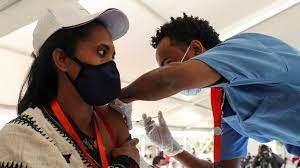“The hospital used that period to observe if a patient would experience anaphylaxis, that is going into shock,’’ she said.
According to online health platform Mayo Clinic, anaphylaxis is a severe, potentially life-threatening allergic reaction that can occur within seconds or minutes of exposure to an allergen. Its signs and symptoms include a rapid or weak pulse, skin rash, nausea and vomiting.
“After the injection, we tell patients to wait for 15 minutes post-admission, usually to look for serious side effects. But we’ve not had that since we started.
“For those that have been back with side effects following their vaccination, all the categories have been minor. We’ve had issues of feverish feelings, body pains, headaches, dizziness but it’s all been minor. We’ve not had any life-threatening conditions,’’ Afolayan said.
She added that the number of people being vaccinated had increased steadily since the programme started at the hospital, noting, “Presently, we do close to 100 vaccinations every day.’’
The doctor noted that anyone above 18 years, apart from COVID-19 patients, whose results had not been confirmed negative is eligible to take the vaccine at the centre.
She, however, said that pregnant women need to get a clearance from their doctors to be eligible to receive the vaccine.
Afolayan advised that anyone who experienced any adverse reactions after receiving the COVID-19 vaccine should report immediately to the nearest primary healthcare centre.
NAN recalls that on March 2, Nigeria received the first batch of 3.94 million doses of AstraZeneca vaccines (COVISHIELD) from COVAX.
COVAX is co-led by Gavi, the Vaccine Alliance, World Health Organisation and Coalition for Epidemic Preparedness Innovations, working in collaboration with organisations that include UNICEF, World Bank, manufacturers and civil society organisations.
source: Punch

 The Nigerian Navy Reference Hospital, Ojo, Lagos, says it has not recorded any adverse effect from people vaccinated with the AstraZeneca vaccine in its facility. Head of Public Health Department at the NNRH, Dr. Munirat Afolayan, disclosed this in an interview with the News Agency of Nigeria on Thursday in Lagos.
The Nigerian Navy Reference Hospital, Ojo, Lagos, says it has not recorded any adverse effect from people vaccinated with the AstraZeneca vaccine in its facility. Head of Public Health Department at the NNRH, Dr. Munirat Afolayan, disclosed this in an interview with the News Agency of Nigeria on Thursday in Lagos.




